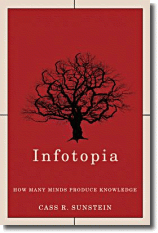The author of many books and articles, his most recent title is Infotopia: How Many Minds Produce Knowledge.

I asked Cass to apply the "page 69 test" to Infotopia. Here is his reply:
On a representativeness scale of 0 to 10, where 0 is "not at all" and 10 is "perfectly," I'd give p. 69 a 7.Many thanks to Cass for the input.
P. 69 does offer a brisk discussion of when members of a group will tell the group what it needs to know. It notes that people will ask whether it's worthwhile, to the group member, to disclose the information -- and often it isn't. If you tell your employer something he doesn't want to hear, disclosure of that information might be all pain and no gain for you. "And if each group member thinks this way, the group will receive only a fraction of the available information." This is a big problem for many groups. Thus p. 69 adds, "There is a lesson here about how to improve deliberation. Suppose that group members are rewarded for telling the truth. If so, then deliberation is likely to benefit from the knowledge of many more minds." (The group might be a company, a labor union, a church group, a faculty, those in the White House.)
A lot of the book is about how and why groups utterly fail to get the information that they need -- about how and why private and public institutions (1) do not elicit the information their own members have, (2) amplify the errors of their most confused members, or (3) go to unjustified extremes. P. 69 captures some of this. It's not entirely representative, though, because the book looks at a lot of other ways to get dispersed information -- as, for example, through wikis (see Wikipedia, for example), blogs (!), open source software, and prediction markets.
Also, I think p. 69 is somewhat less fun than the rest of the book (p. 217, which is exactly 10 more than 69 times 3, is somewhat more fun). But 7, on that 10-point scale, seems to me pretty good for a random page.
Among the praise for Infotopia:
"This extraordinary work synthesizes the latest in how we know, with the latest in what the web has become to map more compellingly than any other book the promise and risk of the information society. As with everything Sunstein writes, this beautiful and clear book has something to teach the experts, and lots to teach the rest of us."The part of Infotopia that deals with prediction markets of course has relevance to elections. For Sunstein's recent gloss on these markets and tomorrow's election, see here and here.
--Lawrence Lessig, author of Free Culture and The Future of Ideas
"In our knowledge-based world, extracting useful information from society is more important than ever. Sunstein convincingly reveals the limitations of popular processes like deliberation while showing how collectives--under certain conditions--can effectively solve many problems. An engaging read, full of eye-opening examples, Infotopia shows how and why our efforts to harness knowledge must evolve."
--Michael J. Mauboussin, Chief Investment Strategist, Legg Mason Capital Management and author of More Than You Know: Finding Financial Wisdom in Unconventional Places
Here's another election-related question:

Suppose that a multimember court has decided (a) that a state must allow same-sex marriage, (b) that a state may not continue affirmative action programs, or (c) that a popular environmental statute is unconstitutional. Suppose too that the opinion is written -- and that a national election will be held in two weeks. Suppose finally that the court is aware that the ruling will have at least some degree of relevance to voters. Should the court refuse to issue the opinion until after the election?Click here to read Sunstein's answer to that question.
Among the topics he has addressed recently in non-academic venues: the costs and benefits to climate change, Barack Obama's book, Obama's political future, "mortality salience"--if people are reminded of their own mortality, their views and behavior tend to change--and what that means for the politics of terrorism, and what Michael Lewis's Moneyball tells us about academic hiring.
Click here to access a number of working papers that Sunstein wrote for the AEI-Brookings Joint Center for Regulatory Studies on subjects like the divergent American reactions to terrorism and climate change.
Previous "page 69 tests":
Paul W. Kahn, Out of Eden
Paul Lewis, Cracking Up
Pagan Kennedy, Confessions of a Memory Eater
David Greenberg, Nixon's Shadow
Duane Swierczynski, The Wheelman
George Levine, Darwin Loves You
John Barlow, Intoxicated
Alicia Steimberg, The Rainforest
Alan Wolfe, Does American Democracy Still Work?
John Dickerson, On Her Trail
Marcus Sakey, The Blade Itself
Randy Boyagoda, Governor of the Northern Province
John Gittings, The Changing Face of China
Rachel Kadish, Tolstoy Lied
Eric Rauchway, Blessed Among Nations
Tim Brookes, Guitar and other books
Ruth Padel, Tigers in Red Weather
William Haywood Henderson, Augusta Locke
Jed Horne, Breach of Faith
Robert Greer, The Fourth Perspective
David Plotz, The Genius Factory
Michael Allen Dymmoch, White Tiger
Patrick Thaddeus Jackson, Civilizing the Enemy
Tom Lutz, Doing Nothing
Libby Fischer Hellmann, A Shot To Die For
Nelson Algren, The Man With the Golden Arm
Bob Harris, Prisoner of Trebekistan
Elaine Flinn, Deadly Collection
Louise Welsh, The Bullet Trick
Gregg Hurwitz, Last Shot
Martha Powers, Death Angel
N.M. Kelby, Whale Season
Mario Acevedo, The Nymphos of Rocky Flats
Dominic Smith, The Mercury Visions of Louis Daguerre
Simon Blackburn, Lust
Linda L. Richards, Calculated Loss
Kevin Guilfoile, Cast of Shadows
Ronlyn Domingue, The Mercy of Thin Air
Shari Caudron, Who Are You People?
Marisha Pessl, Special Topics in Calamity Physics
John Sutherland, How to Read a Novel
Steven Miles, Oath Betrayed
Alan Brown, Audrey Hepburn's Neck
Richard Dawkins, The Ancestor's Tale
--Marshal Zeringue





